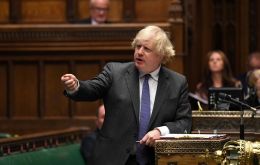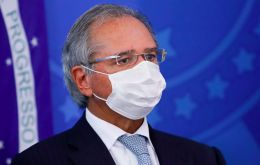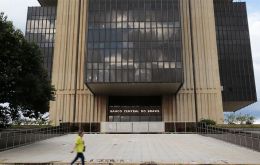MercoPress. South Atlantic News Agency
Tag: crisis
-
Tuesday, June 30th 2020 - 07:43 UTC
Boris Johnson in major speech will pledge billions in public works to jump start the economy

Prime Minister Boris Johnson vowed Britain will spend large sums on hospitals, schools and roads to jump-start the economy as it emerges from the coronavirus lockdown that has plunged the country into what may be the worst recession in three centuries.
-
Friday, May 29th 2020 - 08:50 UTC
Foreigners reduced holdings of Brazilian bonds: market turmoil and political uncertainty

Foreigners reduced their holdings of Brazilian bonds in April to the lowest since 2009, figures on Wednesday showed, against the backdrop of rising financial market turmoil fueled by the coronavirus crisis and domestic political uncertainty.
-
Tuesday, May 26th 2020 - 07:44 UTC
China central bank will further lower interest rates to help revive the economy

China will strengthen its economic policy and continue efforts to lower interest rates on loans, central bank Governor Yi Gang said, reinforcing expectations of further support measures to revive an economy ravaged by the coronavirus pandemic.
-
Saturday, May 9th 2020 - 08:35 UTC
The Lancet claims Bolsonaro is the biggest threat to combat COVID-19 in Brazil

The biggest threat to Brazil's ability to successfully combat the spread of the coronavirus and tackle the unfolding public health crisis is the country's president, Jair Bolsonaro, according to the British medical journal The Lancet.
-
Friday, May 8th 2020 - 09:23 UTC
Argentina's countdown to ninth default; some bondholders and IMF trust a last minute understanding

Argentina's Economy Minister Martin Guzman has given the country's biggest bondholders until this Friday to accept the offer he has put on the table to suspend payments until 2023 and reduce interest rates thereafter. One of the largest of those creditors, the investment management firm BlackRock, rejected Guzman's proposal and immediately presented a counteroffer.
-
Friday, May 8th 2020 - 09:16 UTC
Brazilian government anticipates food shortages and social disorder because of the lockdowns

Brazil could face “economic collapse” in a month's time due to stay-at-home measures to stem the coronavirus outbreak, with food shortages and “social disorder,” Economy Minister Paulo Guedes warned on Thursday.
-
Friday, May 8th 2020 - 08:39 UTC
Nearly a fifth of US children not getting enough to eat since pandemic outbreak

Nearly a fifth of young children in the United States are not getting enough to eat since the coronavirus pandemic erupted, according to research released on Wednesday, highlighting the broader health impact of the crisis.
-
Thursday, May 7th 2020 - 07:47 UTC
Brazil expects exports to China to help mitigate the contraction of the country's economy

Brazilian Economy Minister Paulo Guedes said that according to initial estimates, the country's economy would shrink 6% as a result of the recession caused by the new coronavirus pandemic, but now, thanks to the increase in exports to China, expectations are of a retraction of only 4% this year.
-
Thursday, May 7th 2020 - 07:34 UTC
Brazil lowers interest rates to a record low 3%, with suggestions of a similar cut in June

Brazil’s central bank slashed interest rates more than expected on Wednesday, cutting its benchmark Selic rate by 75 basis points to a record-low 3.00% and previewing another cut as it battles an economic crisis fueled by the coronavirus pandemic.
-
Monday, May 4th 2020 - 08:07 UTC
Argentina cannot afford to pay creditors more

By Martin Guzman (*) – The following piece was published in the Sunday editions of the Financial Times, ahead of a critical countdown in May for Argentina's debts and its creditors:
